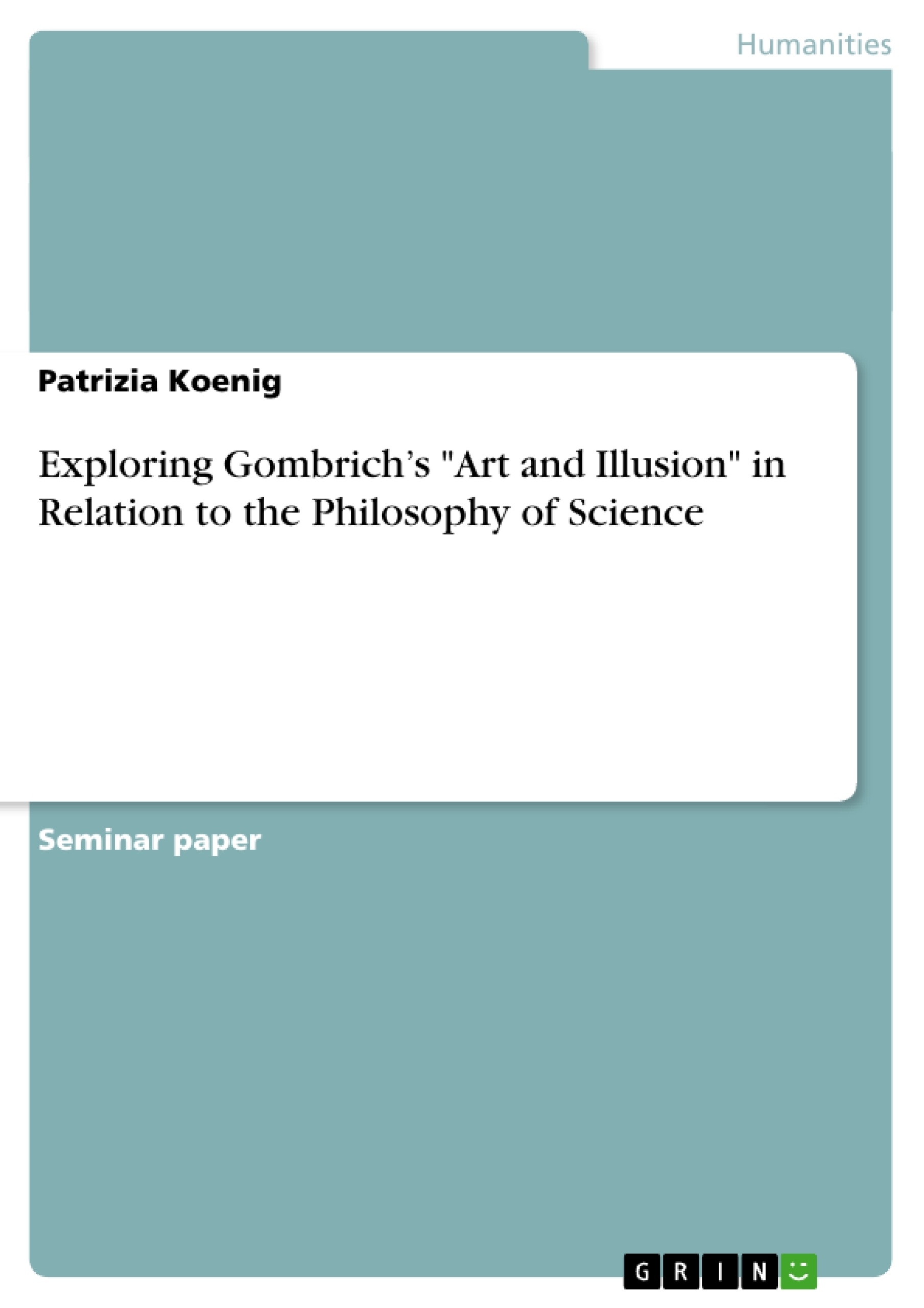In the history of art, Ernst Gombrich’s groundbreaking Art and Illusion: A Study in the Psychology of Pictorial Representation (1960) was influential in arguing against the traditional view of representation of reality in art as imitation. In the philosophy of science, notably Karl Popper and then Thomas Kuhn challenged the concept of progress as the cumulation of factual observations.
This paper wants to approach the larger issue of progress within the framework of Art and Illusion by asking: in how far do concepts of progress as derived from the philosophy of science relate to the notion of arts? More specifically, how did Gombrich challenge the traditional idea of representation as imitation? In following, it will be shown that Gombrich’s methodology and main concepts are greatly indebted to Popper’s theory of falsification. In a second step, Thomas Kuhn’s theory of scientific revolution, which opposes Popper’s writings, will be outlined in relation to Gombrich and his ideas of perception and classification.
Inhaltsverzeichnis (Table of Contents)
- Introduction
- Progress in Art & Science
- "Making Precedes Matching" - Progress through Falsification
- Kuhnian Paradigms & Progress
Zielsetzung und Themenschwerpunkte (Objectives and Key Themes)
This paper explores the concept of progress in art and science by examining Ernst Gombrich's Art and Illusion in relation to the philosophy of science, particularly the ideas of Karl Popper and Thomas Kuhn. The main objective is to analyze how Gombrich's challenge to traditional notions of representation in art aligns with the critiques of scientific progress offered by Popper and Kuhn. The key themes explored include:- The role of falsification in scientific and artistic progress
- The concept of 'mental set' and its influence on perception
- The limitations of viewing progress as a linear accumulation of knowledge
- The importance of historical and social context in understanding progress
- The role of paradigms and scientific revolutions in shaping scientific understanding
Zusammenfassung der Kapitel (Chapter Summaries)
Introduction
This section introduces the paper's focus on the concept of progress in art and science. It highlights John Constable's view of art as a scientific pursuit, leading to the discussion of traditional ideas of mimesis and progress in both art and science. The paper aims to investigate how Gombrich's work challenges these traditional views, particularly through his analysis of representation in art.Progress in Art & Science
"Making Precedes Matching" - Progress through Falsification
This section explores Gombrich's critique of the traditional view of mimesis as imitation, arguing that stylistic changes in art are not solely based on visual perception. He emphasizes the role of the 'mental set,' a pre-existing conceptual framework that influences the artist's perception and interpretation of reality. Gombrich's approach aligns with Popper's theory of falsification, rejecting the idea of progress as a linear accumulation of factual knowledge. He suggests that progress in both art and science occurs through a process of "making and matching," where hypotheses are generated and tested against the real world, leading to ongoing refinement and evolution.Kuhnian Paradigms & Progress
This section introduces Thomas Kuhn's ideas on scientific progress and its relation to Gombrich's work. Kuhn's concept of paradigms as shared conceptual frameworks within scientific communities is discussed in relation to the 'mental set' as a framework for artistic perception. The section also explores Kuhn's two main types of progress: progress within a paradigm through puzzle-solving activities and progress through paradigm shifts or scientific revolutions. While Gombrich's work emphasizes the continuous process of "making and matching," Kuhn suggests that scientific progress is more discontinuous and revolutionary, driven by the emergence of new paradigms. Despite their differing perspectives on the nature of progress, both Gombrich and Kuhn emphasize the importance of historical context and the influence of shared frameworks on perception and knowledge acquisition.Schlüsselwörter (Keywords)
The keywords and key themes of this paper encompass the intersection of art and science, specifically focusing on the concept of progress. It delves into the theories of falsificationism, as proposed by Karl Popper, and the Kuhnian paradigm shift model, applying these frameworks to analyze the evolution of artistic representation and scientific understanding. Central terms include mimesis, mental set, "making and matching," paradigms, scientific revolutions, and the historical and social context of knowledge production.Frequently Asked Questions
What is Gombrich's main thesis in 'Art and Illusion'?
Gombrich argues against the view that art is a simple imitation of reality, suggesting instead that representation is a psychological process of 'making and matching'.
How does Karl Popper influence Gombrich?
Gombrich's methodology is deeply indebted to Popper's theory of falsification, viewing artistic progress as a series of tested and refined hypotheses.
What is a 'mental set' in art?
A 'mental set' is a pre-existing conceptual framework or schema that influences how an artist perceives and represents the world.
How does Thomas Kuhn's theory relate to art history?
Kuhn's concept of paradigms and scientific revolutions can be compared to Gombrich's ideas on classification and the historical shifts in artistic styles.
Is progress in art linear?
The paper examines the concept of progress, questioning if it is a cumulative process of facts or a series of revolutionary shifts in perception and shared frameworks.
- Arbeit zitieren
- Patrizia Koenig (Autor:in), 2012, Exploring Gombrich’s "Art and Illusion" in Relation to the Philosophy of Science, München, GRIN Verlag, https://www.grin.com/document/214769



